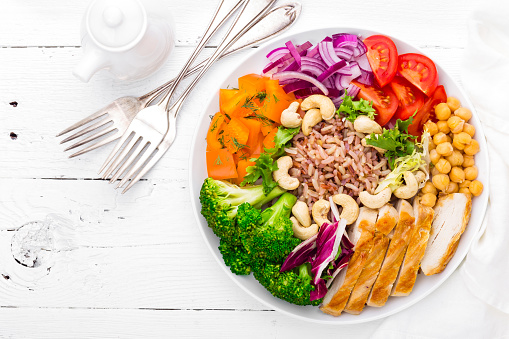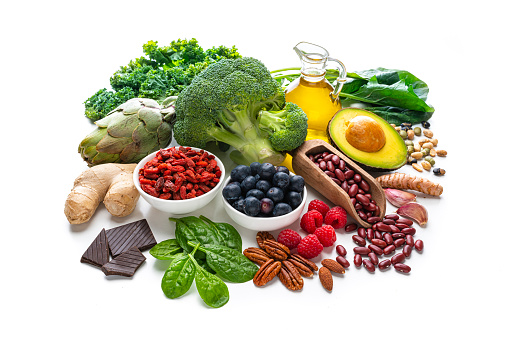What Is PCOS (Polycystic Ovarian Syndrome)?
Polycystic Ovary Syndrome (PCOS) is a common hormonal disorder that affects women of reproductive age. It is estimated that up to 10% of women have PCOS, although many cases go undiagnosed.
PCOS is a complex disorder that involves a combination of hormonal imbalances -specifically high levels of androgens like testosterone, insulin resistance, and inflammation.
Women with PCOS have a hormonal imbalance that can lead to irregular periods, infertility, weight-loss resistance and ultimately put them increased risk for metabolic syndrome.
In fact, women with PCOS are two times as likely to suffer from metabolic syndrome than women without PCOS. Metabolic syndrome is characterized by elevated blood sugar, abnormal cholesterol, abdominal weight gain, and high blood pressure.
Collectively, these risk factors put women at increased risk for heart disease and diabetes making it even more vital that women seek treatment.
While the exact cause of PCOS is unknown, there is a genetic component. And you are much more likely to have PCOS if you have a first degree relative with it.
Common Signs of PCOS
PCOS can cause a range of symptoms, which can vary from person to person. Some common symptoms of PCOS include:
Irregular periods
Excess hair growth (hirsutism)
Acne/oily skin
Weight gain
Fatigue
Mood changes
Not every person with PCOS will experience similar symptoms. While many women who have PCOS are overweight or obese, you can still be quite lean and still have PCOS.
How is PCOS Diagnosed?
Diagnosis for PCOS can be complex. It’s estimated that one-third of women who have PCOS don’t receive a diagnosis until after seeing 3 or more health professionals!
To be diagnosed with PCOS you must meet 2 of the 3 criteria and various other conditions must be ruled:
Irregular Menstrual Cycles or No Menstrual Cycles
Hyperandrogenism (i.e. high levels of testosterone)
Polycystic Ovaries diagnosed via pelvic ultrasound

The Common 4 Types of PCOS
According to Dr. Lara Briden, author of the Period Revolution there are 4 main types or drivers of PCOS.
One type which I won’t really get into is post-pill PCOS. When coming off the pill, there can be a temporary surge in androgens that mimic a PCOS state. But this is nothing to worry about as it’s a byproduct of coming off of the pill.
The other 3 types of PCOS include insulin, inflammatory, and adrenal-mediated PCOS. Some women can fit into more than one-type, as well.
Insulin Resistant PCOS
This is a condition in which the body is less able to use insulin effectively, leading to high blood sugar levels.
This can cause the ovaries to produce more androgens, which are male hormones that can interfere with ovulation and lead to other symptoms of PCOS.
To understand if insulin-resistance is a problem for you, there are a variety of tests that can be performed including measuring your fasting glucose, fasting insulin, hemoglobin A1C (a measure of blood sugar averages over 3 months), and a glucose-tolerance test which measures your blood glucose response after consuming 75 grams of glucose.
The best way to treat insulin-resistance is to focus on reducing insulin levels via diet, exercise, and supplementation - as needed.

Diet Strategies for Treating Insulin Resistance PCOS
Because carbohydrates impact the production of insulin the most, focus on not only paying attention to the quantity of total carbohydrates you consume but the quality of carbohydrates.
The best types of carbohydrates for PCOS include complex carbohydrates like whole fruit, vegetables, whole grains, beans and lentils which are rich in soluble fiber which blunt the blood sugar response.
Limit your intake of highly refined carbohydrates and added sugars that cause your blood sugar to spike quickly.
Utilize the ‘plate method’ to promote more balanced blood sugars if you are not counting carbohydrates. Make ½ of your plate non-starchy veggies, ¼ of your plate a lean protein, and the last ¼ of your plate contain a complex carbohydrate like a sweet potato, whole grain tortilla, or brown rice.
Other Strategies for Treating Insulin Resistance PCOS
Strength-training is also a great way to improve insulin sensitivity. Strength training is exercise modality that applies a stimulus or resistance to your muscles which cause them to adapt and grow stronger.

Muscles utilize 3 times as much fuel as fat cells, therefore, incorporating strength training is a great way to build muscle and be able to more easily utilize carbohydrates for fuel which in turn reduces insulin levels.
Aerobic exercise and even low-intensity steady state exercise like walking can also be beneficial. Several studies show that even a 15 minute walk after eating can be effective in reducing blood sugar levels.
Lastly, aside from resorting to traditional diabetes medications like metformin to reduce insulin, there are several well studied supplements that have been shown to help regulate blood sugar and lower insulin. Some of my favorites that I used in my practice include myo-inositol, chromium, and vitamin D.
Inflammatory PCOS
The second type of PCOS is considered inflammatory. In this situation, the ovaries produce too much testosterone as a result of inflammation.
Inflammation can be due to eating too many inflammatory foods like refined flour, sugar, vegetable oils, or eating foods that aggravate a food intolerance or even allergy (e.g eggs, wheat, dairy products). Inflammation can also stem from gut-issues like infections or viruses and even environmental toxins and endocrine disruptors.
Strategies for Treating Inflammatory PCOS
Your best course of treatment will depend on the exact cause of inflammation but the goal is to reduce inflammation by either removing the trigger food or substance, eliminating the pathogen, improving the health of your environment, and/or nourishing your gut microbiome with a combination of prebiotic or probiotic rich food to promote diversity in bacteria.
An anti-inflammatory diet may also be helpful if your diet tends to be low in fruits, vegetables, nuts, seeds, and other plant foods rich in antioxidants. To maximize your antioxidant intake - eating ‘a rainbow’ of plant foods like leafy greens, red peppers, onions, garlic, blueberries, grapes, and sweet sweet potatoes to name a few.

If you suspect you also have insulin-resistance, balancing your blood sugar should also take priority -as uncontrolled blood sugars also contribute to inflammation.
Eating more omega 3 fats found in fatty-fish, walnuts, and flaxseed can also fight inflammation as many Americans don't get nearly enough healthy fats in their diet.
Lastly, you could consider supplements like curcumin, NAC (N-Acetyl=cysteine), glutathione, resveratol or fish oil.
Adrenal PCOS
The last type of PCOS which also happens to be the less common is adrenal PCOS–characterized by high levels of DHEAS which is a precursor to testosterone.
Ninety-percent of DHEAS is secreted by the adrenals with the remainder being produced by your ovaries. If you have high DHEAS and normal testosterone and another androgen called androstenedione - your adrenals could be to blame for your PCOS.
Your adrenal glands help you buffer stress whether physical or emotional by releasing cortisol and androgens. Learning to manage stress or outright eliminate certain stressors in your life is essential for treating adrenal PCOS.
You may already know where your biggest source of stress is coming from - possibly a stressful career, financial concerns, a crumbling relationship, or the loss of a loved one. However, your source of stress may not not always be as obvious and each person can tolerate a different amount of stress.

A few questions to ask yourself if you think you have adrenal-induced PCOS:
- Are you getting adequate sleep?
- Are you finding time for self-care or burning the candle at both ends?
- Are you engaging in a lot of high-intensity forms of exercise?
- Are you eating enough calories and/or carbohydrates?
Lack of sleep, overdoing it on exercise, and under-eating can all put additional stress on your adrenals.
Women with PCOS are much more susceptible to eating disorders likely due to experiencing more weight-loss resistance than women without PCOS and fearing that certain foods will worsen their condition.
It’s important if you are attempting to lose weight not eat less than 80% of your maintenance calories to prevent further metabolic dysfunction and nutritional deficiencies.
In addition, if you have been in a calorie deficit for an extended period of time, consider taking a diet break to not only alleviate your body’s stress response but also recalibrate other hormones that could take a hit as a result of chronic dieting like your thyroid.
Other strategies for managing stress include engaging in more gentle forms of exercise like walking, yoga, meditating, journaling, and breath work.
Avoid or minimize how frequently you engage in very intense forms of exercise like HIIT which can worsen adrenal PCOS.
You also may find supplements like adaptogens and magnesium helpful in reducing stress which can improve your overall symptoms.
However, diet and lifestyle changes should be prioritized first before incorporating supplements no matter what type of PCOS you have.
The Best Treatment for Your PCOS Type
Being able to effectively manage your PCOS to reduce symptoms and optimize your fertility - largely depends on the type and/or types of PCOS that you are dealing with.
If you are struggling with PCOS and have yet to figure out what interventions are best for your specific PCOS profile, I highly recommend working with a doctor or Registered Dietitian who can help you figure out the best line of treatment.
I offer both group coaching for women who are weight-loss resistance, as well as 1 on 1 nutrition coaching for a higher level of support. Please reach out if you'd like support with weight-loss and/or regaining your fertility!
I hope you found this article helpful!
Alisa Fields MS, RD, LD